Vedius Pollio facts for kids
Publius Vedius Pollio was a wealthy and influential Roman citizen who lived during the time of the first Roman Emperor, Augustus. He was a member of the equestrian order, a respected group of important people in Roman society. While he was a friend of Emperor Augustus and held a position of power in the Roman province of Asia, Vedius Pollio became most famous for his incredibly luxurious lifestyle and, unfortunately, for his extreme cruelty towards his servants. His actions even led to a famous incident involving Emperor Augustus himself.
Quick facts for kids
Publius Vedius Pollio
|
|
|---|---|

Coin depicting Vedius Pollio (left)
|
|
| Born | 1st century BC |
| Died | 15 BC |
| Nationality | Ancient Roman |
Contents
Publius Vedius Pollio: A Roman Story
Early Life and Public Service
Publius Vedius Pollio was born in the 1st century BC. His father had once been a servant but gained his freedom. Vedius Pollio rose to become a member of the equestrian order. This was a respected group of wealthy Roman citizens, just below the senators.
After Octavian became the sole ruler of the Roman world in 31 BC, Vedius Pollio was given an important job. He was put in charge of the Roman province of Asia. This was unusual for someone of his rank, suggesting he had special skills or connections. He likely served in this role for a few years before returning to Rome.
A Life of Luxury and Cruelty
Despite his service to the state, Vedius Pollio became most known for his incredible luxury and harshness. He owned a huge villa near Posillipo, on the Gulf of Naples. The poet Ovid later described this villa as being "like a city" because of its size.
Most famously, Vedius Pollio kept a pool of lampreys. These are a type of fish. He would throw servants who displeased him into this pool as a form of punishment. This was considered an extremely cruel act.
Emperor Augustus Intervenes
Even with his reputation for cruelty, Vedius Pollio remained friends with Emperor Augustus for some time. He even built a shrine in Augustus's honor in Beneventum.
One day, Emperor Augustus was having dinner at Vedius Pollio's home. A young servant accidentally broke a valuable crystal glass. Vedius Pollio immediately ordered the servant to be thrown into the lamprey pool. The terrified servant fell to his knees before Augustus. He begged the emperor for a more humane way to die.
Emperor Augustus was horrified by Vedius Pollio's cruelty. He stepped in to stop the punishment. Not only did Augustus prevent the execution, but he also ordered all of Vedius Pollio's expensive glasses to be smashed. He then had the lamprey pool filled in. According to some ancient writers, Augustus even freed the servant. This event showed Augustus's disapproval of such extreme cruelty.
Vedius Pollio's Final Years
Vedius Pollio passed away in 15 BC. He left a large part of his wealth to Emperor Augustus. This included his magnificent villa at Posillipo. Vedius Pollio also asked Augustus to build a suitable monument on the villa's site.
Augustus decided to demolish part of Vedius Pollio's house in Rome. In its place, he built a beautiful colonnade. This was called the Porticus of Livia, named after his wife. He dedicated it in 7 BC.
Vedius Pollio's Lasting Story
How Vedius Pollio's Story Lived On
The story of Vedius Pollio's treatment of his servants and Emperor Augustus's reaction became very popular. People in ancient times often told these stories. They used them to discuss ideas about right and wrong, and about how leaders should act.
For example, the Roman poet Ovid praised Augustus for tearing down Vedius Pollio's house. Ovid saw this as a strong statement against too much luxury and bad behavior. The philosopher Seneca the Younger used the story to teach about the dangers of anger and the importance of kindness.
Lessons from History
Even today, historians and thinkers look back at Vedius Pollio's story. It helps us understand Roman society and the values of the time. It shows how even powerful emperors like Augustus could stand up against extreme cruelty. The story reminds us that treating others with respect and kindness is important, no matter their position in society.
 | Leon Lynch |
 | Milton P. Webster |
 | Ferdinand Smith |


